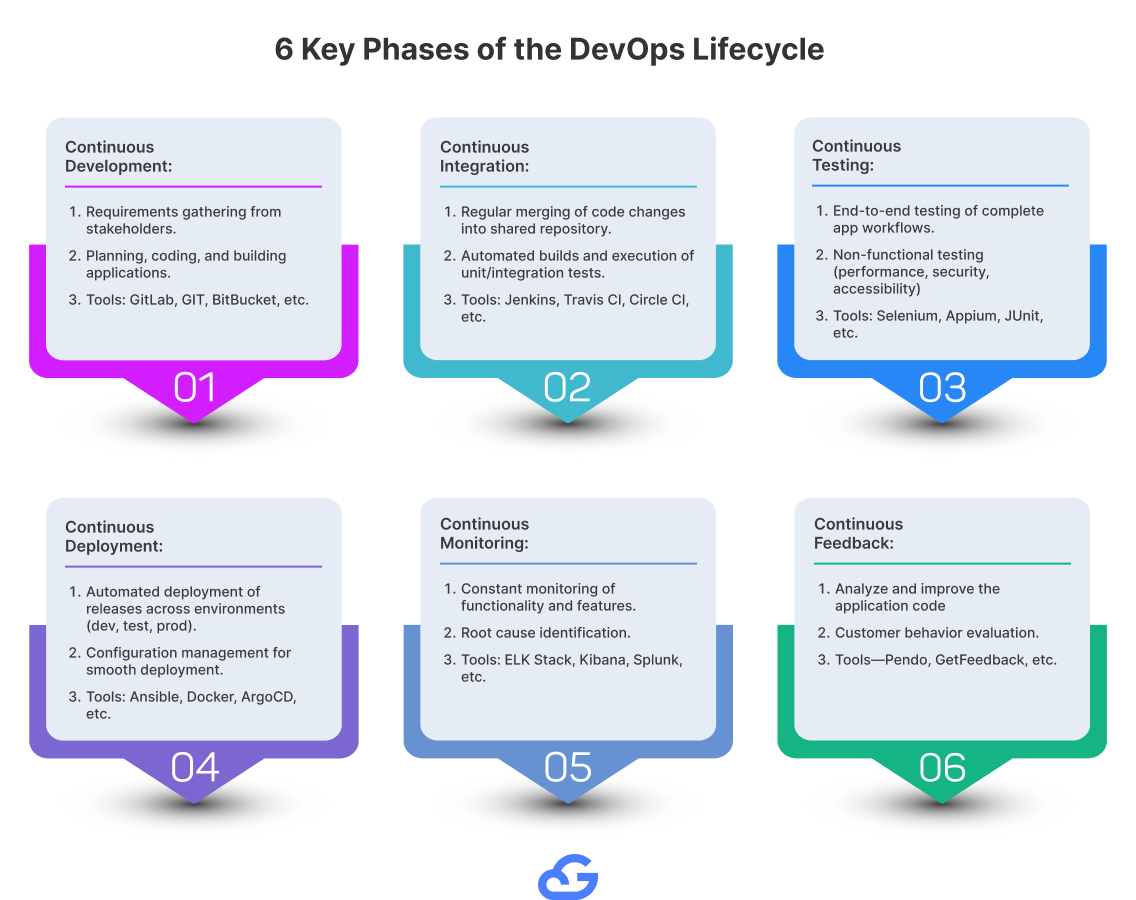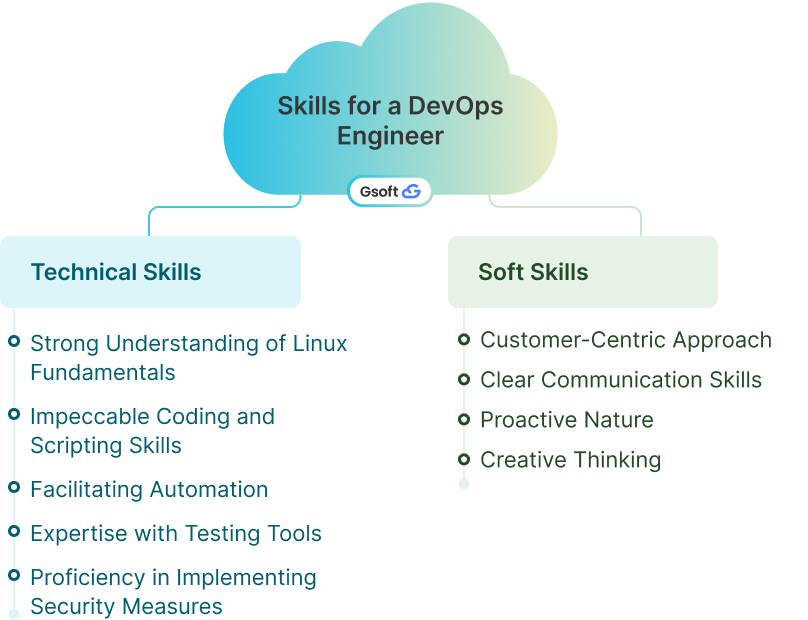Blogs / Cloud DevOps & Automation
10 Essential Skills for the Perfect DevOps Engineer
By
Sherin Job Varghese
Posted: March 7, 2023
• 7 Minutes
DevOps is a contemporary software application development approach that prioritizes agility. By embracing it, companies can quickly produce software applications and reduce their time to market. But what exactly is DevOps? And what skills must a DevOps engineer possess to help companies get maximum value from it?
With this blog post, we aim to address these questions. The following sections of this blog will briefly explore the concept of DevOps while highlighting the vital skills that empower DevOps engineers to excel in this field.
So, let’s begin with a short overview of DevOps.
What is DevOps?
DevOps combines development and IT operations, emphasizing a cultural shift that fosters the usage of practices and tools to enable improved collaboration, automation, and continuous integration and delivery. It helps break down silos, which was a major challenge in traditional software development approaches. By embracing a DevOps model, companies can reduce their software release cycles while seamlessly meeting fluctuating customer demands without impacting performance and availability. Let’s examine the six key phases of the DevOps lifecycle and the different tools used in each stage for more clarity.

We have briefly covered the concept of DevOps; let’s now shift our focus to the core topics of this blog post—what is a DevOps engineer, and what are the essential skills required to become an effective DevOps engineer?
What is a DevOps Engineer?
A DevOps engineer is an IT professional with skills that span both development and operations. In short, DevOps engineers bridge the gap between these two distinct departments and streamline software application delivery using automation, collaboration, communication, and continuous improvement practices across each stage of the software development lifecycle. These professionals make sure that application development proceeds efficiently without compromising on quality by combining development and operations. And because of this, their role is extremely tricky and important.
They must be proficient in both development and operations processes and have a grasp of automation tools and methodologies (Infrastructure as Code, CI/CD, etc.) required for maintaining a smooth workflow. On top of this, since collaboration, communication, and customer-centricity are fundamental to DevOps, they must possess excellent soft skills as well.
In the following subsections, we will list down the role and responsibilities of DevOps engineers and highlight the necessary technical and non-technical skills they must possess to master DevOps.
Roles & Responsibilities of DevOps Engineers
Here are some of the core roles and responsibilities of DevOps engineers:
- Assessing existing systems, practices, and processes and identifying ways to modernize them.
- Integrating advanced automation tools and frameworks.
- Comprehending stakeholder requirements and communicating them to the developers.
- Collaborating with developers and IT operations teams to streamline software releases.
- Overseeing testing processes, evaluating codes, and analyzing results.
- Conducting root cause analysis.
- Troubleshooting technical issues.
- Ensuring regulatory compliance and implementing security best practices.
- Monitoring and managing infrastructure, access controls, etc.
- Planning, strategizing, and enhancing overall project management.
Essential Technical Skills for DevOps Engineers
Choosing DevOps for your business depends on a range of factors, including your specific business objectives, the nature of your software development and operations processes, your readiness for cultural and technical changes, and your long-term business strategy. You need to address the following factors before going for DevOps:

-
Strong Understanding of Linux Fundamentals:
Linux is a highly secure and stable open-source operating system that many organizations use. It offers a flexible environment for various aspects of DevOps, such as process management, system administration, text processing, file handling, server management, and more. A DevOps engineer must be proficient in all these aspects and should be able to automate testing environments, perform configuration management, and incorporate advanced security settings.
Key areas of expertise include:
- Proficiency in Linux administration tasks—user management, package management, file system management.
- Experience working with different Linux distributions and distros and understanding their nuances.
- Familiarity with a wide range of Linux command-line tools and utilities for tasks such as text processing, network management, and system monitoring.
-
Impeccable Coding and Scripting Skills:
DevOps engineers often must write codes and scripts. Therefore, it is important for them to possess deep knowledge of different programming languages, such as Python, Java, Ruby, Bash, etc. Each of these languages enables them to write codes and scripts for automating builds, testing frameworks and applications, and much more.
With good coding and scripting skills, DevOps engineers can:
- Automate infrastructure provisioning and deployment processes.
- Create custom scripts and tools for automating routine tasks, monitoring, and reporting.
- Integrate different tools and services through APIs.
-
Facilitating Automation:
Automation is one of the key aspects of DevOps. A specialist DevOps engineer must be able to automate the entire pipeline, from CI/CD and infrastructure configurations to application performance tracking. By automating the entire application development pipeline, DevOps engineers can maintain the iterative nature of the overall process, resulting in faster and more effective development and deployment.
Automation helps streamline crucial tasks such as:
- Provisioning infrastructure (Infrastructure as Code).
- Configuration management.
- Testing and deployment.
- Monitoring and logging.
-
Deep Knowledge of Cloud Technology:
DevOps engineers with deep knowledge of cloud computing can use it to drive innovation, scalability, and agility in the software development process. By leveraging cloud platforms like AWS, Azure, and GCP, DevOps engineers can seamlessly provision, scale, and manage resources on-demand. This enables the development and operations teams to rapidly set up testing environments, deploy applications with ease, and iterate on solutions.
Additionally, cloud-native services and tools offer numerous automation and integration capabilities. This helps accelerate software delivery, enhance collaboration, and drive continuous improvement in the DevOps pipeline.
Cloud-based solutions can enhance DevOps by:
- Optimizing infrastructure management with IaC and automated provisioning.
- Automating build, test, and deployment processes using built-in CI/CD tools or integrations.
- Integrating containerization technologies like Kubernetes for efficient deployment and management of containerized applications at scale.
- Streamlining cloud monitoring and logging, enabling automated monitoring, alerting, and performance analysis.
-
Expertise with Testing Tools:
Having a good understanding of various testing tools and methodologies is a fundamental requisite for a DevOps engineer. Testing plays a vital role in the delivery of high-quality software releases throughout the development lifecycle. And DevOps engineers with good expertise in testing are adept at integrating various testing tools and procedures into the CI/CD pipeline.
A good DevOps engineer should be familiar with unit testing frameworks, integration testing tools, performance testing tools, security testing tools, and test automation frameworks, which cover the total DevOps pipeline. Additionally, they must also be proficient with various testing types (regression, functional, non-functional) and testing principles to ensure the highest level of quality.
By integrating testing tools into CI/CD pipelines, DevOps engineers can:
- Detect and address issues early in the development process.
- Ensure faster feedback loops.
- Accelerate software delivery
-
Proficiency in Implementing Security Measures:
Implementing the best security measures is an important technical trait for DevOps engineers. They must be familiar with prominent security frameworks such as OWASP, NIST, etc., along with compliance regulations like GDPR, HIPAA, and more. They should also have knowledge of secure coding practices and infrastructure configuration, identity and access management principles, and security monitoring techniques.
By embedding security practices throughout the DevOps lifecycle, engineers can identify and mitigate risks, ensuring the delivery of secure and compliant applications and infrastructure.
Important Soft Skills for DevOps Engineers
-
Customer-Centric Approach:
A DevOps engineer must always place the customer at the core. They must understand the user demands and requirements and translate these to developers, testing professionals, and other stakeholders involved in a project. That is, DevOps engineers must steer the entire team towards the common goal of achieving complete customer satisfaction.
By embracing a customer-centric approach, DevOps engineers must:
- Prioritize features and requirements based on customer feedback.
- Ensure user experience is a key consideration in development and deployment.
- Gather customer insights and incorporate them into the continuous improvement process.
-
Clear Communication Skills:
Effective communication is the foundation of DevOps. It involves collaboration among various stakeholders, like programmers, system administrators, etc. Therefore, it is vital that DevOps engineers possess strong communication skills to ensure everyone remains aligned with the project goals.
Clear communication skills are essential for:
- Bridging gaps between teams.
- Facilitating knowledge sharing.
- Enabling effective collaboration.
- Gathering and disseminating feedback.
-
Proactive Nature:
A proactive nature is the hallmark of DevOps engineers. They must stay committed to learning new things. The DevOps ecosystem is constantly evolving with new tools, processes, and best practices, and it is vital that DevOps engineers proactively keep track of all these changes.
A proactive mindset enables DevOps engineers to:
- Always stay ahead of the curve.
- Identify innovative solutions.
- Embrace a culture of learning.
- Lead by example.
-
Creative Thinking:
A DevOps engineer must always think out-of-the-box. They are often tasked with finding solutions for the most intricate problems and translating them into highly technical concepts or solutions. This means that they always have to approach problems from a unique perspective all the time.
Creative thinking will help DevOps engineers to:
- Tackle complex challenges.
- Drive innovation.
- Optimize processes and workflows.
- Simplify complex concepts.
Summary:
Even though DevOps has evolved a lot from its early days, the underlying practices and procedures remain the same. It represents a cultural shift, which is all about fostering a collaborative environment centered around agility, continuous improvement, and innovation. In order to master this thriving field, it is necessary to have both technical and non-technical skills. Try to learn the skills that we have outlined in this blog and conquer the challenging domain of DevOps.
Looking for a trusted partner to outsource your DevOps initiatives? Reach out to us at www.gsoftcomm.net/contact-us/.


Get Know More About Our Services and Products
Reach to us if you have any queries on any of our products or Services.











